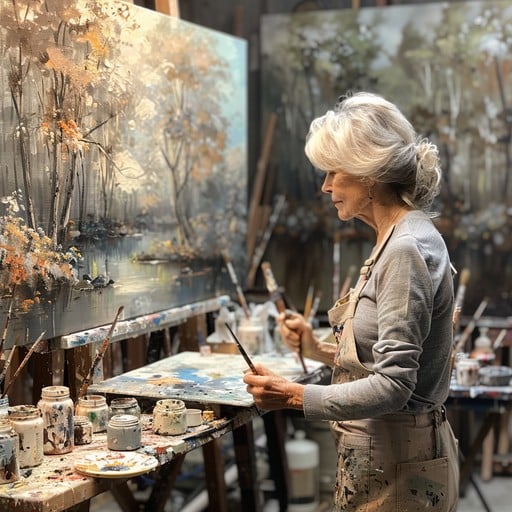I was watching the documentary about Billy Joel and he mentioned that he decided to stop writing songs at 44 years old. The documentary was fun to watch, as I got to listen to his music, but it got me to thinking about the issue of creativity and age.
Does creativity necessarily decline with age? The answer is a complex yes and no.
Songwriters report losing their creativity as they age. Billy Joel was most prolific in his 20s and 30s. Bob Dylan famously wrote Blowing in the Wind on the back of a napkin. Dylan claims that he can no longer write songs at the level that he used to write them. Another musical artist who reported a decline in his songwriting abilities was Bruce Springsteen. Most rock and pop musicians do not continue to write songs after their 30s or 40s.
When I was at Bell Laboratories, I worked with a number of particle physicists who informed me that this phenomenon of creativity declining with age was prominent with major physics breakthroughs. Albert Einstein was 26 when he developed the Theory of Relativity. And while he continued to work, he was never able to successfully find a solution to the Theory of Everything.
Several artists were also most creative in their younger years. Picasso invented Cubism when he was 26 years old.
Yet, many artists and musicians continued to innovate as they aged. Beethoven wrote his Ninth Symphony when he was 53 years old (and deaf). Handel wrote The Messiah when he was 56 years old. Mozart was especially productive at the end of his life (but he died at 35).
The relationship between age and creativity depends on many factors, one of them is the field of study. Some creative domains—such as songwriting, physics, science, and mathematics tend to have early peaks and relatively rapid declines, whereas other fields that require extensive knowledge and skill such as medicine, history, some art, humanities, and philosophers—show later gradual peaks of creativity.
Thirty-one Nobel Prize Winners in the field of economics were evaluated as to when they made their most significant contributions to the field. There were two peak cycles of creativity, one very early in their careers and another later in their life. The difference between those who experienced a peak in creativity during their mid-twenties and those who peaked in their mid-50s, was the type of creativity.
People who were conceptual innovators—those who think “out of the box,” challenge conventional wisdom, and create paradigm shifts were most creative at an earlier age. The second group built on their knowledge and discovered new and innovative methods within existing frameworks. They worked through trial and error at a more gradual pace.
Examples of young, conceptual innovators include Picasso, T.S. Eliot, Melville, and Einstein. Examples of innovators who produced their best work later in life include Cezanne, Matisse, Robert Frost, Virginia Woolf, and Darwin.
Career age is more important than chronological age. Some late bloomers do not truly hit their stride until their 60s or 70s (think of Georgia O’Keefe). They sometimes had uninspiring jobs for decades before discovering their true passion.
There are several reasons for the decline in creativity with age. Abstract reasoning may be affected by brain changes associated with aging. Speed of processing and working memory decline with age.
But one of the most important reasons for creativity decline is becoming more accepting of and steeped in the norms and a desire to work within them. When young, it is easy to dismiss the work of others, but as we age and become familiar with the work, we are more appreciative of the thought and effort that went into it.
Another reason for creativity decline may be a decrease in motivation, sometimes believing that we have accomplished what we wanted to accomplish, lessened ambition, or a feeling that a “prime time” for creativity has passed. Billy Joel cited that the tiresome nature of rhyming, his process (which required him to work alone), and that he had said all he wanted to say—had contributed to his desire to give up pop songwriting. (He did explore other genres and wrote an album of classical music.)
There are instances where creativity increases with age. Older adults have a wealth of knowledge and experience that can be valuable for creative problem-solving. This is especially true when applying knowledge from one field to another.
Our brain continues to form new neural connections throughout life. Thus, there are ways to improve and maintain creativity as we age. One way is to allow our minds to wander and wonder. Creative breakthroughs often occur when the mind is not actively focused on a specific task.
Other sources of creativity are interacting with others, learning new disciplines, and engaging in new experiences. The good news is that creativity is not a static ability that inevitably declines with age. It’s a complex process that can be maintained and even enhanced if we are willing to exercise it.
Angela Rieck, a Caroline County native, received her PhD in Mathematical Psychology from the University of Maryland and worked as a scientist at Bell Labs, and other high-tech companies in New Jersey before retiring as a corporate executive. Angela and her dogs divide their time between St Michaels and Key West Florida. Her daughter lives and works in New York City.



Bob Moores says
Great article, Angela. Could I add Newton to your list of notables? He was 22-24 when he developed the calculus, discovered the three laws of motion and universal law of gravitation.